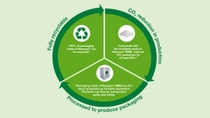Sostenibilidad
BASF's biomass balance approach: saving fossil resources in the production of EPS

The biomass balance method (BMB), certified by German technical inspection authority REDcert, means that fossil raw materials required for the manufacture of EPS (expandable polystyrene) can be replaced with renewable feedstock. Production methods of this kind save valuable resources and reduce CO2 emissions at the same time. The use of biomass-balanced Styropor® and Neopor®, known as Styropor® BMB and Neopor® BMB for short, protects the environment and the climate while maintaining the usual high quality. This is because they are identical to their fossil equivalents in terms of their formulation and properties.
Sustainable Building: How to improve your carbon footprint with Neopor® solutions from BASF
The Ellen MacArthur Foundation's Circular Economy (CE) 100 network, just as BASF, supports the mass balance approach as a way to promote circular economy in the chemical industry. The White Paper, written in collaboration by members of the CE100 network, describes the theory and practice of mass balancing in detail. The collaborative project (co.project) provides an opportunity to examine sustainable innovations in a pre-competitive context to overcome general obstacles and increase the pace of change. With insulation boards made of Neopor® BMB and packaging solutions made of Styropor® BMB, BASF already offers its customers certified products according to the biomass balance approach.

